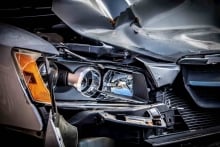Injured in a Car Accident? Let Us Help You Move Forward
When you or a loved one is hurt in a car accident, your focus should be on healing—not battling insurance companies or navigating complex legal processes. If your injury was caused by someone else’s negligence, the emotional strain, financial pressure, and uncertainty can feel overwhelming.
At Brandon J. Broderick, Attorney at Law, we’re more than just legal professionals—we’re your advocates, your advisors, and your support system. We believe that exceptional client care means clear communication, no legal jargon, and a commitment to making the process as stress-free as possible. We’re not like other firms—and that’s exactly why so many clients trust us to handle their most serious cases.
No Win, No Fee—Guaranteed
When you hire a car accident lawyer from our firm, you pay nothing upfront. We work on a contingency basis, which means we only get paid if we win your case. No recovery? No legal fees. Without legal representation, insurance companies may pressure you into accepting a settlement that doesn't come close to covering your losses. We won’t let that happen.
Let Us Turn Your Setback Into a Comeback
Our legal team has a proven track record of securing substantial settlements and verdicts for car accident victims. We’ll fight for the compensation you deserve—covering your medical bills, lost income, pain and suffering, and more—so you can focus on rebuilding your life.
Don’t let an insurance company decide your future. Contact Brandon J. Broderick, Attorney at Law, today for a free consultation. Let us put our experience, compassion, and tenacity to work for you. Contact us now at (877) 448-7350
In this article, we'll go through a comprehensive overview of car accident information for victims and their loved ones.
Turn Your Setback Into a Comeback
What to Do After a Car Accident
Investigating and Gathering Evidence After a Car Accident
How Much is My Car Accident Case Worth?
Economic Damages in a Car Accident
Non-Economic Damages in a Car Accident
How is Fault Determined in a Car Accident
Car Accidents and Insurance Companies
Tips for Dealing with Insurance Adjusters
Time Limits for Filing a Claim
Brandon J. Broderick is Here for You 24/7

Brandon J. Broderick, Car Accident Lawyers, Turn Your Setback Into a Comeback
Recover the full cost of medical expenses and injuries—now and in the future
Even serious injuries can be slow to present with symptoms, which allows them time to develop into something even more serious and more difficult to treat. Often, insurance companies will attempt to contact an injured victim and try to settle for very little as quickly as they can. It’s critical to give yourself time to fully consider the scope of your injuries and how those injuries not only affect your expenses now but also how those injuries could affect your quality of life later and future wages.
Experienced negotiators and trial attorneys
Without a legal claim, the insurance company can offer you a lowball offer that barely covers any of your needs and may even refuse to cover some of the damages. Insurance companies are in business to collect money, not to pay out claimants. As a result, they work vigorously to pay victims as little as possible. By having legal representation with Brandon J. Broderick, Attorney at Law, our law firm will handle all communications with the insurance company on your behalf and work toward securing the compensation you rightfully deserve. And, if an agreeable negotiation can’t be had, we won’t hesitate to take the case to trial—and win.
Turning setbacks into comebacks
Brandon J. Broderick, Attorney at Law can step in and handle everything so you can focus on healing. Our team of experienced car accident attorneys will work with you to achieve the settlement that you deserve. We will do everything possible to defend your rights and will work with you by your side to help you through such a trying time. Contact Brandon J. Broderick, Attorney at Law, for a free consultation. With our proven track record of success and our commitment to client care, we can turn your setback into a comeback.

What to Do After an Accident
The immediate moments after a car accident can be scary and confusing for car accident victims. Preparing ahead of time for an emergency is your best bet to remaining calm immediately after an accident. Here are a few important tips that you want to heed if and when you are involved in a motor vehicle accident, and these include the following:
- Check if anyone was hurt (those few minutes can mean life or death to an injured accident victim). If someone was hurt, call an ambulance immediately.
- If your vehicle is in the line of traffic, move it out of the way and into a position of safety if possible.
- Don't admit guilt! Whether or not you think it's your fault, never admit guilt at the scene because it can complicate the claims process later on.
- Call the police so you can have them write up an accident report.
- Document the scene. Take pictures of the vehicle damage, where the vehicles landed, your injuries, any skid marks and any road or weather conditions that might have played a role in the accident.
- Exchange vital information with the other driver, including driver's license numbers, insurance policy numbers, contact information, license plate numbers, names and phone numbers (yours and theirs), etc.
- Gather the names and phone numbers of any eyewitnesses to the accident; you will need them later on.
- As soon as possible, contact a personal injury attorney.
It's always a good idea to keep a notepad and pen and a disposable camera inside your glove box in case you don't have a cell phone handy. Make sure to call the police and get an accident report. It's not a wise idea to avoid the insurance agencies and instead accept a cash offer from the other party. You may have no idea as to the extent of your injuries or the property damage to your vehicle. Hiring a car accident attorney may ultimately enable you to collect far more compensation from the other party than if you tried to handle it on your own.
If you’ve been injured in a car accident, don’t wait. Contact us today for a free consultation. With our proven track record of success and our commitment to client care, we can turn your setback into a comeback.

Investigating and Gathering Evidence After a Car Accident
Witness statements, accident reports, medical records, and victim testimony are all highly effective and typical types of evidence in a car crash case. Obtaining witness testimony is essential if you are pursuing a case against the driver who caused the accident. Witnesses can provide vital evidence showing negligence on behalf of the other driver, which will help you receive damages for your medical bills and losses.
Medical evidence is also critical to your car accident claim. First responders who attend to accident victims can be leveraged to identify injuries that occurred immediately after the accident. Additionally, medical experts and records provide valuable information about the nature of the injury and its origins, which is why it’s so critical for car crash victims to seek medical attention immediately after an accident.
Many types of evidence from an automobile accident can be collected in electronic form. Photographs of the crash scene and/or of skid marks on the road might be taken with a digital camera. If a traffic light was ignored, nearby traffic cams might have captured that violation. Other witnesses may have captured the crash on their cell phones. Expert testimony can be used to interpret cellular data and determine whether a defendant was likely on his or her smartphone at the time of a collision.
Most newer automobiles in the United States are equipped with an event data recorder (EDR). The National Highway Traffic Safety Administration defines this technology as a device that can record a vehicle’s technical and occupant information during the moments before, during, and after a collision. The technology can measure and capture such information as:
- Vehicle speed;
- The rate of acceleration and deceleration;
- Steering angle;
- Brake application; and,
- Many other metrics.
The data recorded by an EDR can be critical in an auto collision case because it can provide a more accurate, credible picture of fault.
Electronic information gathered from EDRs, medical records, witness and victim testimony, and related sources can be vital to an auto crash claim, especially when combined with other solid evidence and an excellent legal approach.

How Much is My Car Accident Case Worth?
This is a common question we hear, but not a very easy one to answer. All motor vehicle accidents are unique, and the value of your claim will depend on the facts and circumstances involved. Generally, we help our clients pursue the maximum compensation possible for all damages resulting from their accident.
Before you can figure out if a settlement offer is fair, you need to know how much your injuries are worth. An offer may seem like a lot of money until you realize that this amount won’t even begin to cover your medical expenses, lost wages, and other potential losses. You may be thinking of current or recent medical bills, but you may also be eligible to recover compensation to help pay for your damages. Damages come in two forms: economic damages and non-economic damages.
Economic Damages in Car Accident
Economic damages refers to the compensation you can receive for the loss of money caused by the automobile accident. Non-monetary harm caused by your accident (e.g. pain and suffering) and punitive damages are not included in economic damages. In personal injury cases, a successful plaintiff receives one economic damages award. In other words, you only get paid once for all of your money losses—both past and future. Past economic damages refer to financial losses you already have incurred at the time of the award. Because you have already incurred these costs at the time of the award, past economic damages are normally easy to calculate—usually by looking at your bills. Examples of past economic damages include
- Medical Bills
- Lost Income
- Car Repair costs
- Costs related to loss of a vehicle, such as rental car or towing
Calculating your future economic damages can be complex and often requires experts. Medical experts may be needed to determine the severity of an injury and what could be expected for a long-term prognosis. An economist or labor expert may be needed to calculate the loss of an income and projected income over a long period of time. Hiring a personal injury lawyer to navigate this complexity and ensure your best interest is important, especially in cases with serious long-term injuries. Examples of future economic damages include:
- Future medical costs
- Future nursing care costs
- Future lost earnings/loss of earning capacity
- Money to pay for household services that you are no longer capable of performing
Hiring a personal injury lawyer to navigate the complexity of your future damages and ensure your best interest is important, especially in cases with serious long-term injuries
Non-Economic Damages in Car Accident
In a personal injury claim for a car crash, non-economic damages can be awarded to compensate the victim for pain and suffering as a result of sustaining an injury. Other examples of non-economic damages include emotional distress, loss of enjoyment of life, and, if the victim died, loss of companionship or consortium.
Pain and suffering refers to the physical and/or emotional stress associated with an accident and the injuries caused by it. For example, if a driver suffered a burn injury, the driver would probably recover money for the agony of enduring the injury itself, the associated treatment, the discomfort it caused, and any limitations imposed on the claimant's lifestyle. The driver would also likely recover money for the stress and limitations associated with being permanently injured.
There are no specific rules around how pain and suffering are calculated in a claim. Insurance companies and car accident lawyers look at the severity and permanency of your bodily injuries. Other factors include the long-term effect on lifestyle factors like sleep and the daily living routine, as well as relationships in home and work environments.
Because of the complexity and judgment required to estimate pain and suffering, a skilled car accident attorney is imperative to get the compensation you deserve. Their experience will help you to be prepared to explain and justify your calculation.
With our dedication to client care and long track record of success, you can count on us to work tirelessly for your quality of life. We’ve helped people just like you move forward after sustaining an injury that was caused by another’s negligence. Contact us now at (877) 448-7350
How is Fault Determined in a Car Accident
Determining who is at fault in a car accident is a detailed process based on the legal concept of negligence. In essence, fault is assigned to the person who failed to act with the same reasonable care that a prudent individual would have under similar circumstances, thereby causing the accident. This determination is not made arbitrarily; rather, it is the result of a thorough investigation conducted by insurance companies and, if necessary, legal professionals, who analyze all available evidence to piece together the events that led to the collision.
The investigation into fault relies on several key pieces of evidence. A police report is often the starting point, as it provides a neutral, on-scene account of the incident, including officer observations, driver and witness statements, and any traffic citations issued. The physical evidence is also critical; this includes the location and severity of damage to the vehicles, the presence of skid marks on the road, and the final resting positions of the cars. Photographs and videos taken at the scene are invaluable for documenting these details.
Traffic laws play a fundamental role. A driver who violates a rule of the road—such as speeding, running a red light, or making an improper lane change—is frequently found to be negligent and, therefore, at fault. Witness testimony from passengers or bystanders can provide an impartial perspective on which driver acted carelessly. In more complex cases, accident reconstruction experts may be hired to analyze the evidence and provide a scientific opinion on how the crash occurred. Ultimately, by systematically gathering and analyzing these various forms of evidence, a clear picture emerges of which driver's actions constituted a breach of their duty to drive safely, leading to the assignment of fault for the accident.

If you’ve been injured in a car accident caused by someone else's negligence, contact Brandon J. Broderick, Attorney at Law, for a free case review.

Negligence in Car Accidents
Legal responsibility for a car accident usually boils down to whether the person or entity at fault acted negligently in causing the car crash. In some cases, such as a drunk driving accident, it can be easily established that the act of criminal negligence is what caused the accident and the person should be held liable for the damages. There are other situations, however, when the negligent acts of another are not quite as black and white, yet the responsible party still should be held accountable.
Negligent behavior behind the wheel comes in many forms. Examples of behavior leading up to the car accident that could indicate the driver acted negligently include
- Drunk driving
- Drugged driving
- Distracted driving
- Speeding
- Failing to obey traffic signals or signs
- Driver fatigue
- Driving aggressively
Under law, there are four elements to proving negligence in your personal injury claim:
Legal Duty. All drivers have a legal duty to everyone else on the road, including other drivers, bicyclists, and pedestrians. That duty requires drivers to operate their vehicles in a reasonably safe manner that will avoid accidents and injuries to others.
Breach of Duty. You must be able to prove that the average person, given the circumstance and knowledge that the defendant had at the time, would have known that someone might have been injured as a result of his or her actions, and furthermore, the average person then would have acted differently than the defendant did in that situation. For example, the average person likely knows that drunk driving is the cause of many injuries.
Causation. To prove causation, you need to show that the other party’s breach of duty is what caused your injuries. Courts look at whether the defendant’s actions produced foreseeable consequences. In the drunk driving example, causation is likely more obvious. But there are some cases where a car accident exacerbates an existing injury, which is why it's so critical to seek medical attention and a legal consultation as soon as possible.
Damages. Once you establish the defendant had a legal duty, that duty was breached, and the breach of duty was the cause of your injuries, you need to show damages. Damages often come in the form of medical bills and lost wages but can also include things like pain and suffering. When you’re seriously injured, it’s also important to recover future lost earnings or medical care that may be expected down the line.
With our long track record of success, you can count on the car accident attorneys of Brandon J. Broderick, Attorney at Law, to work tirelessly for your case. We’ve helped people just like you move forward after sustaining an injury that was caused by another’s negligence. Contact us now at (877) 448-7350

Causes of Car Accidents
While some car accidents are caused by bad weather conditions, the highest percentage involve the recklessness of other motorists, such as drunk driving accidents, distracted or negligent driving, speeding and reckless driving, or fatigued vehicle operators. Distracted driving can also mean that a driver was engaging in actions such as texting while driving or other activities that affect their ability to control their vehicle. Other causes could include defective auto products or a vehicle that has not been well maintained. Being involved in an auto accident can be not only painful and traumatic, but it can also cost you lost income if you've been impaired physically and can no longer work.
Drunk Driving Accidents
More than 10,000 people are killed in drunk driving accidents every year. The legal system heavily punishes those who are caught drinking and driving, and if you or a loved one has been injured by a drunk driver, you should act now to pursue damages against the driver responsible for the car accident.
When a drunk driver causes an accident, the driver will likely have legal liability to anyone his actions injure. Whether you were a passenger in the same vehicle as a drunk driver, if you were in another car, or if you were a pedestrian, you can file a lawsuit in order to obtain financial compensation for your injuries or a wrongful death claim if you lost a family member. Your personal injury lawsuit will be targeted at recovering sufficient financial compensation to pay for all your expenses arising from the drunk driving accident.
A few points of consideration include the level of impairment and policy limits. A drunk driver can be found negligent even if the driver’s level of impairment was under the legal limit. Additionally, if there are multiple victims in a drunk driving accident, the driver’s insurance can only cover liability to victims up to the policy limits. Or, the driver is not the only party who may have liability to victims of a drunk or drugged driving incident.
Distracted Driving Accidents
According to the Centers for Disease Control and Prevention (CDC), every day in the United States, 9 people are killed in distracted driving crashes and over 1,060 people are injured at the hands of a distracted driver. What is distracted driving? Distracted driving refers to when a driver engages in any activity that takes their attention away from the primary task of driving.
There are three main types of driver distraction, and these include
- Visual distraction (taking your eyes off the road)
- Manual distraction (taking your hands off the wheel)
- Cognitive distraction (taking your mind off driving)
According to the National Highway Traffic Safety Association (NHTSA), distracted driving is a dangerous epidemic on America's roadways. In 2018 alone, 2841 people were killed in distracted driving accidents, according to the NHTSA. Of all the forms of distracted driving, texting while driving is by far the most dangerous because it involves all three elements of distraction: visual, manual, and cognitive. The NHTSA reports that cell phone use was reported in 18% of the distracted-related fatal crashes and that texting takes the driver's eyes off the road for 4.6 seconds; that's equivalent to driving the length of a football field blindfolded at 55 mph.
Common forms of distracted driving include:
- Texting while driving
- Using a phone or device
- Talking to passengers
- Grooming
- Changing stations on the radio
- Eating while driving
- Operating a navigational system
Cell Phone Laws
In an effort to combat the significant dangers of distracted driving, jurisdictions across the country have enacted laws specifically targeting cell phone use behind the wheel. While the specifics of these laws vary, they generally fall into a few key categories. The most common type of legislation is a ban on manual texting for all drivers, recognizing that typing a message requires a dangerous combination of visual, manual, and cognitive distraction. Building on this, many jurisdictions have implemented broader "hands-free" laws, which make it illegal to hold a cell phone to talk, text, or use other applications while operating a vehicle; drivers in these areas must use features like Bluetooth or speakerphone for any voice communication. Stricter rules are often applied to specific groups, such as complete bans on both handheld and hands-free cell phone use for novice drivers (e.g., teens with learner's permits or intermediate licenses) and commercial vehicle operators like school bus drivers. The enforcement of these laws also differs, with some jurisdictions classifying them as primary offenses, meaning an officer can pull a driver over just for the cell phone violation, while others treat them as secondary offenses, where an officer can only issue a citation for cell phone use if they have already stopped the driver for another traffic infraction.
Drugged Driving Accidents
Drugged driving is driving a vehicle while impaired due to the intoxicating effects of recent drug use. It can make driving a car unsafe—just like driving after drinking alcohol. Drugged driving puts the driver, passengers, and others who share the road at serious risk.
Each drug affects the brain differently. For example, cocaine can make people drive more aggressively than usual, whereas sedatives can cause dizziness and extreme drowsiness, leading to crashes. When alcohol is combined with many types of drugs, the sedating effects can be even more intense.
Aside from marijuana, “prescription drugs are also commonly linked to drugged driving crashes,” reports the NIDA. A 2010 nationwide study discovered that of the fatal crashes, 47% of the drivers tested positive for a prescription drug in their system, reported the NIDA. What was the most common prescription drug in drivers’ systems? Prescription pain relievers, according to the NIDA.
The main prescription drugs of concern include sedatives (tranquilizers and depressants) and prescription opioids; however, antipsychotics as well as prescription stimulants meant to enhance focus and attention are also dangerous when combined with alcohol.
Here are just some of the popular drugs that impair driving ability:
- Nembutal
- Luminal
- Xanax
- Limbitrol
- Valium
- Ativan
- Halicon
- Lunesta, Sonata, and Ambien
- Codeine
- Fentanyl
- Vicodin, Lortab, Lorcet
- Methadone
We’ve helped people just like you move forward after sustaining an injury that was caused by another’s negligence. With our long track record of success, you can count on the car accident lawyers of Brandon J. Broderick, Attorney at Law, to work tirelessly for your case. Contact us now at 877-448-7350

Car Accidents and Insurance Companies
Insurance companies tend to play a huge role in car accident cases. Typically, a victim who gets injured in a motor vehicle accident caused by another driver’ negligence will look to that other driver’s insurance to pay for damages. If you have been injured in an accident, in many cases, a personal injury attorney can negotiate with the insurer to get a more reasonable settlement for your injuries.
The car accident victim’s lawyer’s job frequently involves negotiating with the other driver’s insurance company, either directly with an insurance company employee or indirectly with other attorneys representing the other driver or entity.
An insurance company could be offering you a lower settlement for a number of reasons. For instance, they could believe you are partially at fault for the accident, which would have an effect on the settlement offer. Or, the insurance company is lowballing you and doesn’t think you will fight back to get a fair settlement. Keep in mind that, without an experienced car accident attorney on your side, you may not even be able to estimate your true damages. Some types of damages—such as reduced earning capacity or the need for future medical treatment—require input from an expert that a personal injury attorney can arrange.
It is so important to understand the full value of your claim and to know that you can and should reject any offer that doesn’t fairly compensate you for your losses.
Insurance Adjuster Tips
Understand who the adjuster is working for: Remember, the insurance adjuster is not your friend, and he or she is certainly not on your side, regardless of how friendly he or she might seem. The goal of the insurance company is to see to it that you receive little or no compensation at all, so keep that in mind as you speak to the insurance adjuster and be sure to never let your guard down. If your claim is significant, the adjuster will even attempt to dissuade you from involving an attorney. Without representation, you will be much more vulnerable to their tactics and likely fall prey to a low settlement offer, so whatever you do, hire a car accident lawyer!
What you say might hurt you: Even the most seemingly innocuous statement can come back to haunt your case and derail your chances of obtaining the compensation you deserve. One of the first things an adjuster will ask you is to provide a recorded statement. You should absolutely refuse to do this! You are not required to provide a recorded statement, and, if you do go through with this, the adjuster will take every opportunity to put words in your mouth and ask loaded questions that will inevitably harm your claim. Always avoid giving a statement, especially if you are taking medication for your injuries, which could affect your state of mind and how you choose to answer any questions.
Beware of negative comments: Adjusters often try to imply that a claim might be of little value, suggesting that there might be problems with your case. Remember, these subtle digs are meant to reduce your expectations. If you believe your case has no value, then you will be more prone to accepting a low settlement offer. Do not fall for these tricks.
Avoid the settlement traps: An insurance adjuster can set a number of settlement traps, depending on your case. Some of the most common ones involve encouraging a quick settlement, pressuring an injured victim to accept a settlement, and a pre-diagnosis settlement. The issue with settling too quickly or settling before you are able to obtain a diagnosis for your injuries is that it is impossible to know the value of your claim until you understand your condition, the expected length of your recovery time, the treatments you might need, and the possibility that you might not achieve a full recovery.
No matter what an insurance adjuster may say, you have a right to reject a settlement offer from the insurance company. Accepting an offer will require you to give up important rights, including the ability to file a lawsuit for your injuries. That is why it is so important to understand the full value of your claim and to know that you can and should reject any offer that doesn’t fairly compensate you for your losses. Contact an experienced car accident lawyer for advice and guidance on any insurance settlement offer.
Uninsured Driver Claims
When a driver is injured in an accident caused by a driver who has no auto insurance, they can seek compensation through their own insurance policy, provided they have the appropriate coverage. This process is known as an uninsured motorist (UM) claim. It is a type of first-party claim where you are compensated by your own insurer, who then steps into the shoes of the at-fault, uninsured driver.
There are typically two main types of this coverage. Uninsured Motorist Bodily Injury (UM) coverage pays for medical expenses, lost wages, and pain and suffering for you and your passengers resulting from the accident. Uninsured Motorist Property Damage (UMPD) coverage pays for repairs to your vehicle. Some policies may combine these, while in other places, UMPD is replaced by or supplemented with collision coverage.
A related type of coverage is Underinsured Motorist (UIM), which applies when the at-fault driver has insurance, but their policy limits are too low to cover the full extent of your damages. In this scenario, your UIM coverage can bridge the gap between the other driver's liability limit and your total costs, up to your own policy limit.
To make a successful UM or UIM claim, you must still prove that the other driver was at fault for the accident. Your insurance company will investigate the claim just as an opposing insurer would, requiring evidence such as police reports, medical records, and witness statements to validate the other driver's liability and the extent of your damages before issuing payment.
Your insurance company may try to minimize your injuries and damages, however, and try to pay you as little as possible. However, if you do not have uninsured motorist coverage or your uninsured motorist coverage does not cover the cost of your damages, it may be in your best interest to contact an attorney to discuss your legal options. The car accident attorneys at Brandon J. Broderick, Attorney at Law, will review your policy and the accident that resulted in your injury to determine if you may be entitled to pursue additional compensation by filing a personal injury lawsuit against the at-fault party.
Time Limits for Filing a Car Accident Lawsuit
A critical legal deadline known as the statute of limitations governs the time frame for filing a car accident lawsuit in all jurisdictions. This law establishes a strict time limit within which an injured person must initiate a claim to seek compensation for their losses, including medical bills, lost wages, and pain and suffering. If a lawsuit is not filed before this deadline expires, the claimant almost certainly forfeits their right to sue forever, regardless of who was at fault or the severity of the injuries. The clock for this deadline typically begins to run on the date of the accident itself. However, certain exceptions can alter this timeframe; for example, the "discovery rule" may apply if an injury is not immediately apparent, and special provisions often "toll" or pause the deadline for minors until they reach the age of 18. Furthermore, claims against government entities often have much shorter and more complex notice requirements.
Don't wait. We’ve helped people just like you move forward after sustaining an injury that was caused by another’s negligence. With our compassionate client care and long track record of success, you can count on the car accident lawyers of Brandon J. Broderick, Attorney at Law, to work tirelessly for your case. Contact us now at (877)-448-7350
Car Accident FAQ
What should I do after a car accident?
Immediately after an accident, seek medical treatment for yourself, your passengers and anyone else involved in the car crash. You should also call the police to ensure a police report is filed. Try to take pictures and document the scene as best as you can. Exchange information with other drivers. Once you are in a safe place, call us for a free consultation.
Can I still file a claim if I was partly at fault for the car accident?
Yes, in the majority of places, you can still file a claim and recover compensation even if you were partly at fault for a car accident. The legal systems that govern this scenario are designed to apportion fault between the drivers involved and award damages accordingly. How your partial fault affects your claim depends on which of the following principles applies in the relevant jurisdiction.
The most common system is comparative negligence, which comes in two main forms. Under a "pure comparative negligence" rule, you can recover damages regardless of how much you were to blame. Your compensation will simply be reduced by your percentage of fault. For example, if you were found to be 40% at fault for an accident and your total damages were $100,000, you could still recover $60,000. Under a "modified comparative negligence" system, you can still recover damages, but only if your share of the fault is below a certain threshold—typically 50% or 51%. If your fault exceeds this limit, you are barred from recovering any compensation at all.
A much rarer and stricter doctrine is contributory negligence. In the few jurisdictions that still use this rule, you are completely barred from recovering any compensation if you are found to be even 1% at fault for the accident. Because of these different approaches, the ability to file a claim and the potential amount you can recover when partially at fault are entirely dependent on the specific shared-fault rules of the jurisdiction where the accident occurred.
Can I file a lawsuit after a car accident if I had a pre-existing condition?
A pre-existing condition does not exclude you from recovering damages for a personal injury claim after a car accident. The Eggshell Injury Doctrine is a law that many states have incorporated in order to protect individuals suffering from pre-existing conditions. This law essentially states that individuals with pre-existing injuries have the right to compensation for their injuries, even given the circumstances that their current injuries wouldn’t have been quite as bad if it weren’t for their pre-existing condition. It’s important to consult with a car accident attorney as soon as possible after an accident or illness if you have a pre-existing condition.
Do I have a case if I do not feel hurt?
Personal injury includes injuries to both mind and body. If you have suffered an injury to yourself, whether emotional or physical, through no fault of your own, you may have a case. Typically, you do need evidence to prove your injuries, so it's important to seek medical treatment for any type of injury. It's also possible that if you’ve very recently been in an accident, the adrenaline and shock could be diminishing physical pain.
Will I have to go to trial to recover damages for a car accident?
A majority of personal injury cases are resolved out of court, and a large percentage of the cases that do go to trial are worked out between both parties before the matter is decided by verdict. However, having a skilled trial attorney like Brandon J. Broderick ensures that you have the best possible representation for negotiations and a potential trial.
How is a settlement reached in a car accident?
A settlement is reached when the defendant agrees to pay an amount to the plaintiff in order to drop the case, usually after a period of evidence gathering and negotiation. In many cases, an attorney can negotiate a settlement before a lawsuit is even filed. There are several factors that are considered when determining a settlement amount, including the severity of the injury, pain and suffering, and medical costs.
What do I do if an insurance adjuster calls me?
You shouldn't talk with an insurance adjuster for another person associated with the case. They may appear to be neighborly and thoughtful; however, their best interest does not align with your best interest. No matter what an insurance adjuster may say, you have a right to reject a settlement offer from the insurance company. Accepting an offer will require you to give up important rights, including the ability to file a lawsuit for your injuries.
How do I pay my medical bills until I get my car accident settlement?
If you’ve been injured in a car accident, the first option to pay medical bills -- and the first that must be used -- is PIP insurance. After that fund is exhausted or for other types of claims, most people utilize their own health insurance to pay medical bills until a settlement is reached. If that’s not a possibility or if the insurance policy maximum has been reached, it’s also possible to formally ‘promise’ a healthcare provider that the bills will be paid once the settlement is reached. We can advise you of your options and negotiate with healthcare providers to ensure your treatment is not compromised.
How do I make up for my lost wages until I get my car accident settlement?
Since the insurance for the at-fault party won't pay for your lost wages immediately after the accident or illness, there are a few options to make up for lost wages and pay your bills while you wait for your settlement. PIP insurance can cover lost wages and must be exhausted first. There are other options for loans, lawsuit funding and even bankruptcy. We can advise you of your options and negotiate with healthcare providers to ensure your treatment is not compromised.
What is a release in a car accident settlement?
A release is a document that you sign in return for accepting the settlement funds. By signing the release, you are accepting the settlement and therefore releasing any other claims against the defendant and usually any other defendant related to the incident. In other words, once you settle, you can never reopen the case or try to file a claim for additional compensation. If you are married, your spouse may be required to sign the release as well.

Brandon J. Broderick is Here for You 24/7
We get it. Car accidents can have an impact on your health, well-being, and finances, which can cause worry, fear, and anxiety for you and your family. Wouldn’t it be a relief to know you could count on a trusted friend and advisor to passionately champion you? Someone who’s got your best interests in mind?
At Brandon J. Broderick, Attorney at Law, we believe in exceptional client care, empathy, and results. That’s what makes us one of the best car accident lawyers. With our long track record of success, you can count on us to take the best strategy and work tirelessly for your quality of life. Our attorneys have decades of experience representing victims in car accidents. We’ve helped people just like you move forward after sustaining an injury that was caused by another’s negligence. Contact us today for a free consultation.
Contact us today for a free consultation. Our car accident attorneys are available 24 hours to assist you.